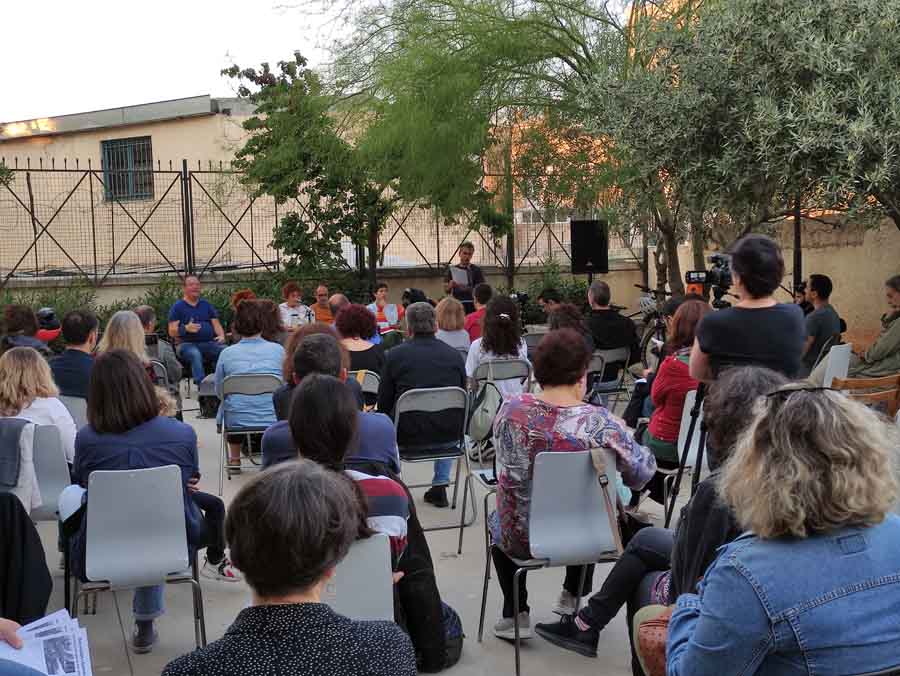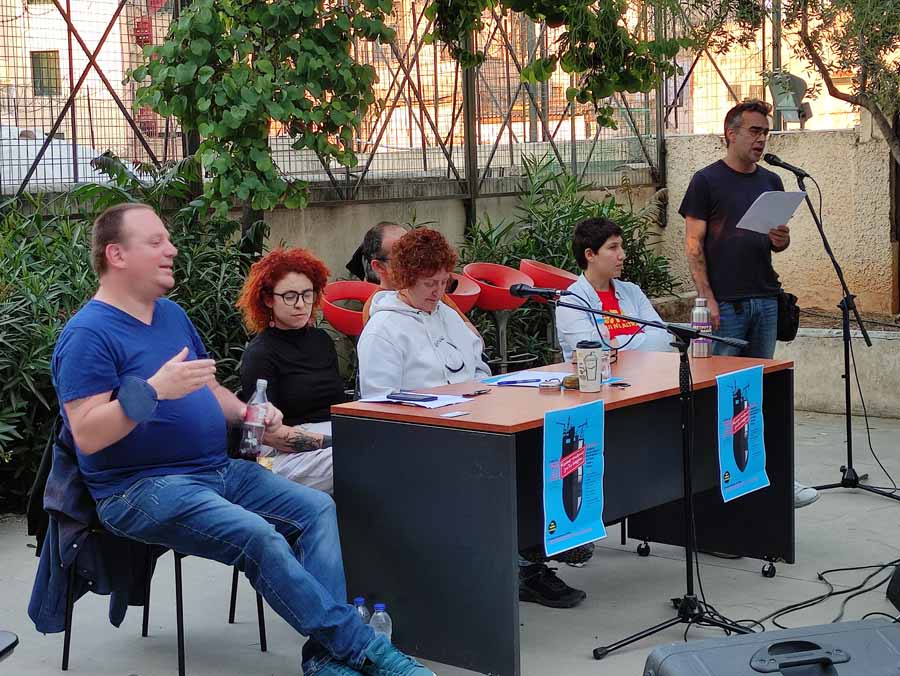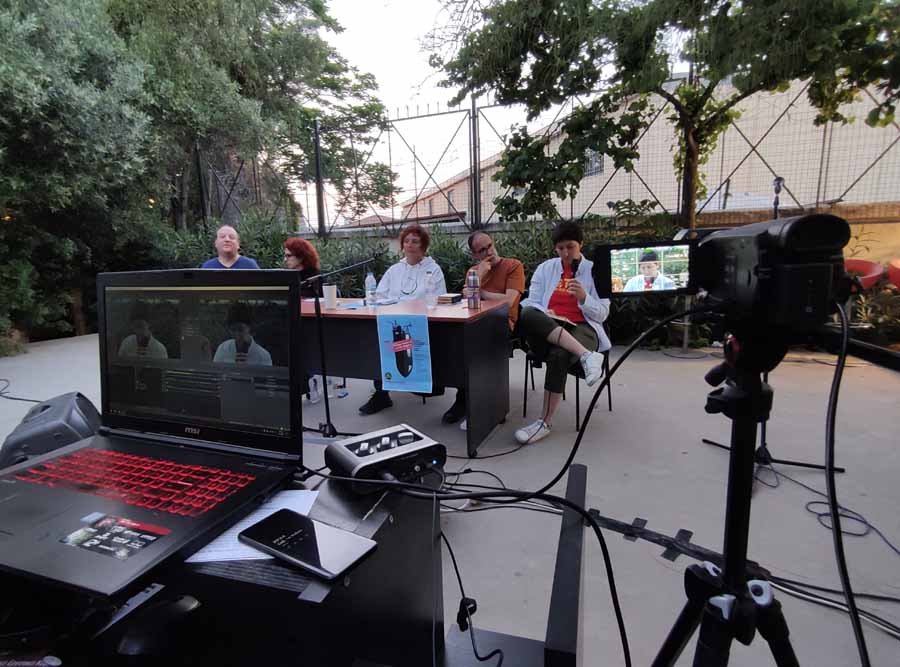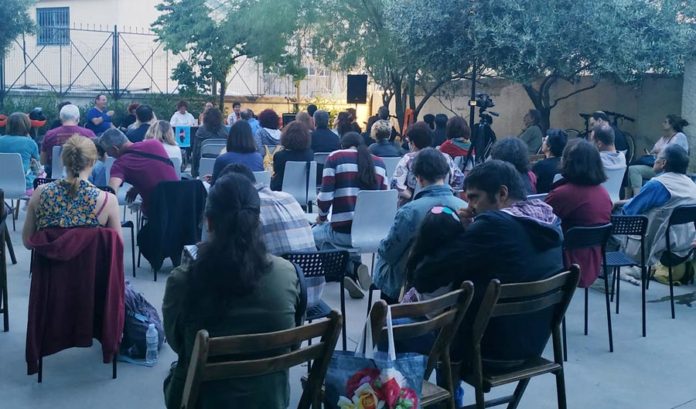We publish the press release of the greek coordination of the Μας σκάβουν τον λάκκο campaign about the recent public meeting in Athens
On Saturday, May 14, at the garden of the Greek Archaeologists Association, a meeting of movements from Greece, Turkey and Cyprus took place; they exchanged information and discussed issues derived from energy, extractions, development of industrial RES, militarisation of the Eastern Mediterranean and geopolitical games.
Kyriakos Halaris, a member of the Initiative Mas Skavoun to Lakko (Don’t Dig) in Greece, started with a brief history of the establishment of the initiative two years ago. This came about as a result of extractions of oil and fossil gas, claims for marine plots and the delimitation of the EEZs (Exclusive Economic Zones) in the Eastern Mediterranean. Environmental groups and organisations in Greece, Turkey and Cyprus coordinated a joint campaign against extractions, not only because of environmental and climatic effects but also because of the escalation of militarisation of the region and heightened tension of Greek-Turkish rivalry.

He pointed out that the current situation is very different, the war in Ukraine has brought about considerable change. The energy issue and fossil fuels form a crucial element of this war, with direct consequences on the daily lives of societies (energy poverty, food crisis, etc.).
The inadequate decisions of the Glasgow Climate Summit are in practice being annulled and talks on extractions are vigorously re-entering the public debate, intensifying geopolitical rivalries even more. Against this background, the aim of this event is to inform about the situation in all three countries and to strengthen the networking of environmental movements, through mutual support, joint actions and the search for alternatives to energy issues.
Fotis Benlisoy, a member of Kazma Birak in Turkey, started his speech emphasising the importance of coordination of environmental groups from the three countries and analysed the political situation in Turkey, concerning Greek-Turkish rivalry. We are currently in a period of declining rivalry, he noted, while Turkish foreign policy is trying to break the isolation of previous years and upgrade its role as a regional power. Especially in the Eastern Mediterranean issues, there is a complete identification of the Erdogan government and the opposition.

At the same time, foreign policy is characterized by intense militarisation as the Turkish army is present in many countries, while the arms industry of the country is a key pillar of the economy. As foreign policy has always been connected with domestic affairs, this moment we are facing elections, which are expected to be particularly tough because it is the first time that Erdogan has lost his social majority. Therefore, foreign oppositions as well as militarisation will play a more and more important role, he concluded.
Çağla Elektrikçi, Turkish-Cypriot and member of Kazma Birak in Cyprus, started her speech reminding that Greek-Turkish rivalry is nothing new and pointed out that fossil fuel drilling added one more element, extending destabilization and further militarisation of the region, which nearly caused a hot episode between the two countries. The start of exploration in Cyprus, in an attempt of the Greek and the Greek-Cypriot governments to exclude Turkey, led to the intervention of the latter to supposedly protect the interests of the Turkish-Cypriots. She noted that all these moves for “peace gas”, as it was called at the time, have led to an increase in the military presence in the region (USA, France, Israel, Russia, Turkey) to protect drilling and also to increasing armament programs on both sides of the island, while nationalism is growing. Drilling for more oil and fossil gas in the already strained Mediterranean, especially in the highly seismic region of the Eastern Mediterranean, threatens local ecosystems and production process, while the climate crisis is even more intensified. Cooperation and solidarity of environmental movements from all three countries, on both sides of the island of Cyprus, is very important for the campaigns of today, but also for those of the future.

Myrto Skouroupathi, a member of the Initiative Mas Skavoun to Lakko in Cyprus, deconstructed the government’s narrative that gas would have a positive effect on peace on the island. She noted that the existence of deposits has been known since 1980, almost as long as the Cyprus question but the process of determining the EEZ was never completed due to relations with Turkey. In 2011, when the first exploration permits were issued, gas was seen as a tool for putting pressure on negotiations on the Cyprus question. The narrative of peace was adopted by Christofias initially and by Anastasiades as well as by Akinci. In 2014, the strategy of the Greek-Cypriot side changed, detached itself from the Cyprus question and eventually led to the collapse of the Crans-Montana negotiations. She stressed that it is known that the profits from the gas will never reach the people since promises for a Revenue Fund that could include the Turkish-Cypriots were never fulfilled. She noted the link between drilling and nationalism and the pressure exerted on activists who criticized and opposed drilling by calling them traitors and agents of Turkey. Finally, she gave concrete examples proving that the leaders are by no means willing to cooperate and support each other on crucial cases of environmental crises (like the water issue on the northern part of the island, fires, sea pollution). She pointed out that the sea from a common good has changed into plots for sale and concluded with a brief presentation of solutions which can make societies energy self-sufficient and sustainable.
Brief interventions followed; Tassos Sarantis, persecuted journalist in the Newspaper of Editors, spoke about the uncontrolled development of RES in the country, the persecution of journalists and activists and about the victories of the movements. Despina Spanoudi, representative of the Panhellenic Network of Collectivities for Energy, stressed the connection of energy with economic and geopolitical rivalry and referred to the causes of the huge increases in energy prices today. Vassilis Chlis from #SaveTinos presented the orgy of repression suffered by the inhabitants of Tinos who are fighting against the destruction of their island. Views were also expressed by the Initiative against Environmental Disaster and Climate Change, the Spartakos Free Soldiers Network, Podoniftis – A Critique of Times and Action, and the political group Xekinima.
The debate was moderated by Emmanuela Terzopoulou from the Movement for the Protection & Restoration of the Great Rafina River. The evening ended with a rebetiko music feast with the group Kaneloriza.



